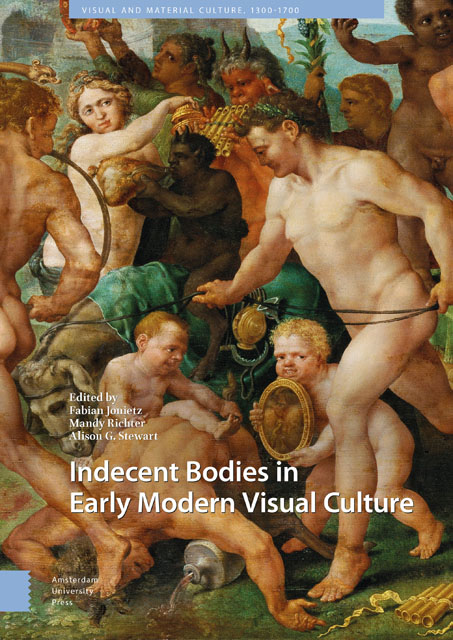Book contents
- Frontmatter
- Table of Contents
- List of Illustrations
- Indecent Bodies in Early Modern Visual Culture: An Introduction
- 1 Taste, Lust, and the Male Body: Sexual Representations in Early Sixteenth-Century Northern Europe
- 2 Private Viewings: The Frankfurt Context of Sebald Beham’s Die Nacht
- 3 To Show or Not to Show? Marcantonio Raimondi and the Representation of Female Pubic Hair
- 4 Treating Bodily Impurities: Skin, Art, and Medicine
- 5 Indecent Exposure and Honourable Uncovering in Renaissance Portraits of Women
- 6 Lust in Translation: Agency, Sexuality, and Gender Configuration in Pauwels Franck’s Allegories of Love
- 7 ‘So this guy walks into a forest…:’ obscenity, humour, sex, and the equine body in hans baldung’s Horses in a forest woodcuts (1534)
- 8 Indecent Creativity and the Tropes of Human Excreta
- 9 ‘It All Turns to Shit’ – The Land of Cockaigne in Sixteenth-Century German Woodcuts
- 10 Noëls and Bodily Fluids: The Business of Low-Country Ceremonial Fountains
- Index
9 - ‘It All Turns to Shit’ – The Land of Cockaigne inSixteenth-Century German Woodcuts
Published online by Cambridge University Press: 19 April 2023
- Frontmatter
- Table of Contents
- List of Illustrations
- Indecent Bodies in Early Modern Visual Culture: An Introduction
- 1 Taste, Lust, and the Male Body: Sexual Representations in Early Sixteenth-Century Northern Europe
- 2 Private Viewings: The Frankfurt Context of Sebald Beham’s Die Nacht
- 3 To Show or Not to Show? Marcantonio Raimondi and the Representation of Female Pubic Hair
- 4 Treating Bodily Impurities: Skin, Art, and Medicine
- 5 Indecent Exposure and Honourable Uncovering in Renaissance Portraits of Women
- 6 Lust in Translation: Agency, Sexuality, and Gender Configuration in Pauwels Franck’s Allegories of Love
- 7 ‘So this guy walks into a forest…:’ obscenity, humour, sex, and the equine body in hans baldung’s Horses in a forest woodcuts (1534)
- 8 Indecent Creativity and the Tropes of Human Excreta
- 9 ‘It All Turns to Shit’ – The Land of Cockaigne in Sixteenth-Century German Woodcuts
- 10 Noëls and Bodily Fluids: The Business of Low-Country Ceremonial Fountains
- Index
Summary
Abstract
Cockaigne, the legendary land of plenty, formed a sub-theme of populardepictions of gluttony in sixteenth-century prints. These imagescombined carnivalesque exuberance and moralising caution, illustratingboth excessive consumption and its ill effects, from inappropriatelylascivious or slothful behaviour to the physical need to expel from topand bottom. Scatological motifs emphasised the grotesque nature ofCockaigne, providing laughter while also warning viewers of theconsequences of gluttonous behaviour in the here and now: that spendingon fleeting pleasure will reduce fortunes to shit. These themes areexplored here chiefly through an exceptionally largemid-sixteenth-century German woodcut now in the New York Public Library,as well as two related woodcuts by Peter Flotner.
Keywords: broadsides; gluttony; grotesque; Land ofCockaigne; scatology
In the thirteenth century, a new locus of yearning emerged in both writtenand oral culture across Europe. In this latest land of plenty, gingerbreadhouses had roofs tiled with pancakes, fences were made from sausages, cookedpigs carried their own carving knives, fried fish swam in rivers of milk,and fountains dispensed the finest Malvasia wine. Its very name reflectedthe land's culinary character: Cucania in Latin,Cuccagna in Italian, Coquaigne inFrench, or Cockaigne in English shared their etymological origin incoquina, the Latin for kitchen. Or alternatively, itsappellation captured Cockaigne's allure as a place exempt from toiland trouble in the German Schlaraffen- orSchlawraffenland and its English and Dutch equivalents‘lubberland’ and luilekkerland. Cockaigne wasquite literally a land of gluttonous layabouts, in which sleep was rewardedand work punished. Full of food and leisure and free from death or disease,this dreamland evoked an earthly paradise or the Golden Age of Greekmythology; and yet, Cockaigne was regarded with suspicion.
One of the earliest written sources, a thirteenth-century poem from theCarmina Burana, already adopted a satirical tone inreference to a Cucanesian abbot holding council with his fellow revellers,and by the sixteenth-century, such moralising was commonplace in accounts ofthe supposed delights of Cockaigne.
- Type
- Chapter
- Information
- Indecent Bodies in Early Modern Visual Culture , pp. 229 - 256Publisher: Amsterdam University PressPrint publication year: 2022



